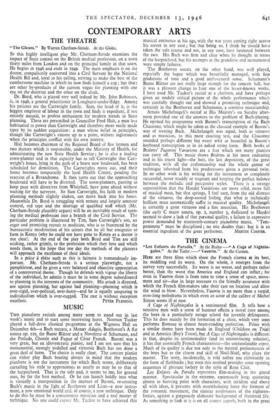CONTEMPORARY ARTS
THE THEATRE
"The Gleam." By Warren Chetham-Strode. At the Globe.
IN this highly intelligent play Mr. Chetham-Strode examines the impact of State control on the British medical profession, on a town thirty miles from London and on the principal family in that town. He begins in 1946 and ends in 1949. The main emphasis is on the doctor, compulsorily converted into a Civil Servant by the National Health Bill and, loyal to his calling, striving to make the best of the cumbersome machine in which he now finds himself a cog ; but there are other by-products of the current vogue for planning with one eye on the doctrine and the other on the clock.
Dr. Boyd, who is played very well indeed by Mr. John Robinson, as, in 1946, a general practitioner in Longhurst-under-Edge. Among his patients are the Cartwright family. Sam, the head of it, is the biggest employer of labour in the town and finds it expedient, if not entirely natural, to profess enthusiasm for modern trends in State planning. These are personified in Councillor Fred Holt, a man less habituated to power than Cartwright and therefore more easily made tipsy by its sudden acquisition: a man whose belief in principles, though like 'Cartiairight's sincere up to a point, withers ingloriously when the principles conflict with his own interest.
Holt becomes chairman of the Regional Board of five laymen and two doctors which is responsible, under the Ministry of Health, for administering the new State Health Service ; he is also a leading town-planner and in that capacity has to tell Cartwright that Cart- wright's house, lying in the path of a brave new boulevard, has been scheduled for demolition. The Cartwrights move out, and their home becomes temporarily the local Health Centre, pending the erection of a Bevandrome. It then turns out that the approaching boulevard will have to be diverted. The town-planners, panting to keep pace with directives from Whitehall, have gone ahead withoin waiting for the surveyor. So Sam Cartwright, his faith in modern planning methods slightly shaken, can move back into his holm% Meanwhile Dr. Boyd is struggling with remote and largely amateur control, red tape and the shortage of qualified staff which (Mr. Chetham-Strode plausibly argues) will be an inevitable result of turn- ing the medical profession into a branch of the Civil Service. The particular problem is illustrated by Tim, Sam Cartwright's son, an eager and promising recruit to medicine, who is so frustrated by the bureaucratic misdirection of his talents that he all but emigrates to farm in Kenya (why he could not have gone to Kenya as a doctor is not clear). At the end of the play both Boyd and Tim are still sticking, rather grimly, to the profession which they love and which needs them, in the hope that one day the methods of the planners will approach the excellence of their ideals.
In a piece 4 these such as this is fairness is tremendously im- portant. Mr. Chetham-Strode is a serious playwright, not a pamphleteer, and he gives a very balanced and objective appreciation of a controversial theme. Though he defends with vigour the liberty of the individual, he admits it must be in some degree subordinated to planning in the interests of the community. His attack is directed, not against planning, but against bad planning—planning which is over-rigid, over-political, over-hasty--and he is equally unsparing to individualism which is over-rugged. The cast is without exception


































 Previous page
Previous page